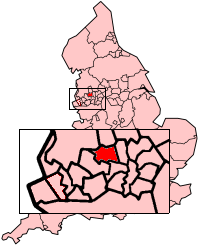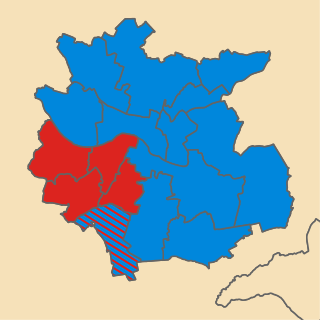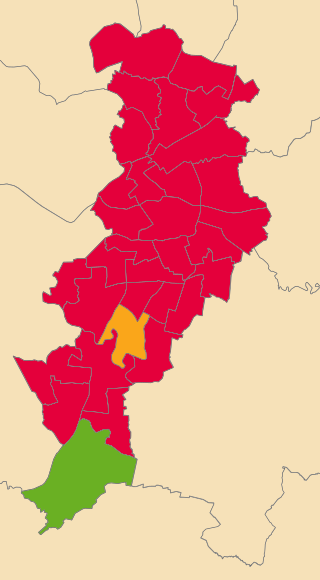
The 2007 United Kingdom local elections were held on Thursday 3 May 2007. These elections took place in most of England and all of Scotland. There were no local government elections in Wales though the Welsh Assembly had a general election on the same day. There were no local government elections in Northern Ireland. Just over half of English councils and almost all the Scottish councils began the counts on Friday, rather than Thursday night, because of more complex arrangements regarding postal votes.

The first elections to the new local authorities established by the Local Government Act 1972 in England and Wales and the new Northern Ireland district councils created by the Local Government Act 1972 took place in 1973. Elections to the existing Greater London Council also took place.
The first elections to the Wolverhampton Metropolitan Borough Council were held on 10 May 1973.
Elections to Sheffield City Council were held on 10 May 1973.

The 1973 Wigan Council elections for the First Wigan Metropolitan Borough Council were held on 10 May 1973, with the entirety of the 72 seat council - three seats for each of the 24 wards - up for vote. It was the first council election as the newly formed metropolitan borough under a new constitution. The Local Government Act 1972 stipulated that the elected members were to shadow and eventually take over from the predecessor corporation on 1 April 1974. The order in which the councillors were elected dictated their term serving, with third-place candidates serving two years and up for re-election in 1975, second-placed three years expiring in 1976 and 1st-placed five years until 1978.
The first elections to the newly created Leeds City Council were held on 10 May 1973, with the entirety of the 96 seat council – three seats for each of the 32 wards – up for vote. The Local Government Act 1972 stipulated that the elected members were to shadow and eventually take over from the predecessor corporation on 1 April 1974. The order in which the councillors were elected dictated their term serving, with third-place candidates serving two years and up for re-election in 1975, second-placed three years expiring in 1976 and 1st-placed five years until 1978.
The first elections to the newly created Solihull Metropolitan Borough Council were held on Thursday, 10 May 1973, with the entirety of the 51 seat council - three seats for each of the 17 wards - up for vote. The Local Government Act 1972 stipulated that the elected members were to shadow and eventually take over from the predecessor corporation on 1 April 1974. The order in which the councillors were elected dictated their term serving, with third-place candidates serving two years and up for re-election in 1975, second-placed three years expiring in 1976 and 1st-placed five years until 1978.
The first elections to the newly created City of Bradford Metropolitan District Council were held on 10 May 1973, with the entirety of the 93 seat council - three seats for each of the 31 wards - up for vote. The Local Government Act 1972 stipulated that the elected members were to shadow and eventually take over from the predecessor corporation on 1 April 1974. The order in which the councillors were elected dictated their term serving, with third-place candidates serving two years and up for re-election in 1975, second-placed three years expiring in 1976 and 1st-placed five years until 1978.

The first elections to Bolton Metropolitan Borough Council were held on Thursday, 10 May 1973, with the entirety of the 69 seat council - three seats for each of the 23 wards - up for vote. It was the first council election as the newly formed metropolitan borough under a new constitution. The Local Government Act 1972 stipulated that the elected members were to shadow and eventually take over from the County Borough of Bolton, the Municipal Borough of Farnworth, the Urban Districts of Blackrod, Horwich, Kearsley, Little Lever, and Westhoughton, and the southern part of Turton Urban District on 1 April 1974. The order in which the councillors were elected dictated their term serving, with third-place candidates serving two years and up for re-election in 1975, second-placed three years expiring in 1976 and 1st-placed five years until 1978.
The 1995 Cardiff Council election was the first election to the new unitary County Council of the City and County of Cardiff following the re-organization of local government in Wales. It was held on Thursday 4 May 1995. It was followed by the 1999 elections. On the same day there were elections to the other 21 local authorities in Wales and community councils in Wales. Labour won a majority of the seats. It was preceded in Cardiff by the 1991 elections to Cardiff City Council and the 1993 elections to South Glamorgan County Council.
The first elections to the newly created Newcastle City Council were held on 10 May 1973, with the entirety of the 78 seat council - three seats for each of the 26 wards - up for vote. The Local Government Act 1972 stipulated that the elected members were to shadow and eventually take over from the predecessor corporation on 1 April 1974. The order in which the councillors were elected dictated their term serving, with third-place candidates serving two years and up for re-election in 1975, second-placed three years expiring in 1976 and 1st-placed five years until 1978.
The first elections to the newly created Barnsley Metropolitan Borough Council were held on 10 May 1973, with the entirety of the 60 seat council - three seats for each of the 20 wards - up for vote. The Local Government Act 1972 stipulated that the elected members were to shadow and eventually take over from the predecessor corporation on 1 April 1974. The order in which the councillors were elected dictated their term serving, with third-place candidates serving two years and up for re-election in 1975, second-placed three years expiring in 1976 and 1st-placed five years until 1978.
The first elections to the newly created Calderdale Metropolitan Borough Council were held on 10 May 1973, with the entirety of the 51 seat council — three seats for each of the 17 wards — up for vote. The Local Government Act 1972 stipulated that the elected members were to shadow and eventually take over from the predecessor corporation on 1 April 1974. The order in which the councillors were elected dictated their term serving, with third-place candidates serving two years and up for re-election in 1975, second-placed three years expiring in 1976 and 1st-placed five years until 1978.
The 1995 Vale of Glamorgan Council election was held on 4 May 1995 to the new Vale of Glamorgan Council unitary authority in Vale of Glamorgan, Wales. It took place on the same day as other council elections in Wales and England. These were the first elections since the re-organization of local government in Wales.
The 1973 Cardiff City Council election was held on Thursday 10 May 1973 to elect councillors to the new Cardiff District Council in Cardiff, Wales. It took place on the same day as other district council elections in the United Kingdom.
The 1973 Gwent County Council election was held on Thursday 12 April 1973 to elect councillors to the new Gwent County Council, governing the new county of Gwent, Wales. It took place on the same day as other county council elections in the United Kingdom.
The 1972 Newport County Borough Council election was held on Thursday 4 May 1972 to elect councillors to the Newport County Borough Council in Newport, Monmouthshire. It took place on the same day as other district and county borough council elections in England and Wales.

The 1976 Bath City Council election was held on Thursday 6 May 1976 to elect councillors to Bath City Council in England. It took place on the same day as other district council elections in the United Kingdom. The entire council was up for election. Following boundary changes the number of wards was increased by one, and the number of seats increased from 45 to 48. This was the second election to the district council, the election saw terms of councillors extended from three to four years. Subsequent elections for the council would be elected by thirds following the passing a resolution under section 7 (4) (b) of the Local Government Act 1972.
The 1975 Sunderland Metropolitan Borough Council election was held on 1 May 1975. A third of the seats on the Council were up for election, with each of the 26 council wards returning one councillor by first-past-the-post. The election was held on the same day as other local elections.

The 2022 Manchester City Council election took place on 5 May 2022. One third of councillors on Manchester City Council were elected. This election was a part of the other local elections across the United Kingdom.






